AMD Ryzen 7 1700 CPU Review
Why you can trust Tom's Hardware
3DMark, Ashes of the Singularity, Battlefield 1 & 4
3DMark
Synthetic benchmarks usually don't provide an accurate measure of real-world gaming performance, but 3DMark's DX11 physics and DX12 CPU tests provide useful insight into the raw horsepower available to the game engine.
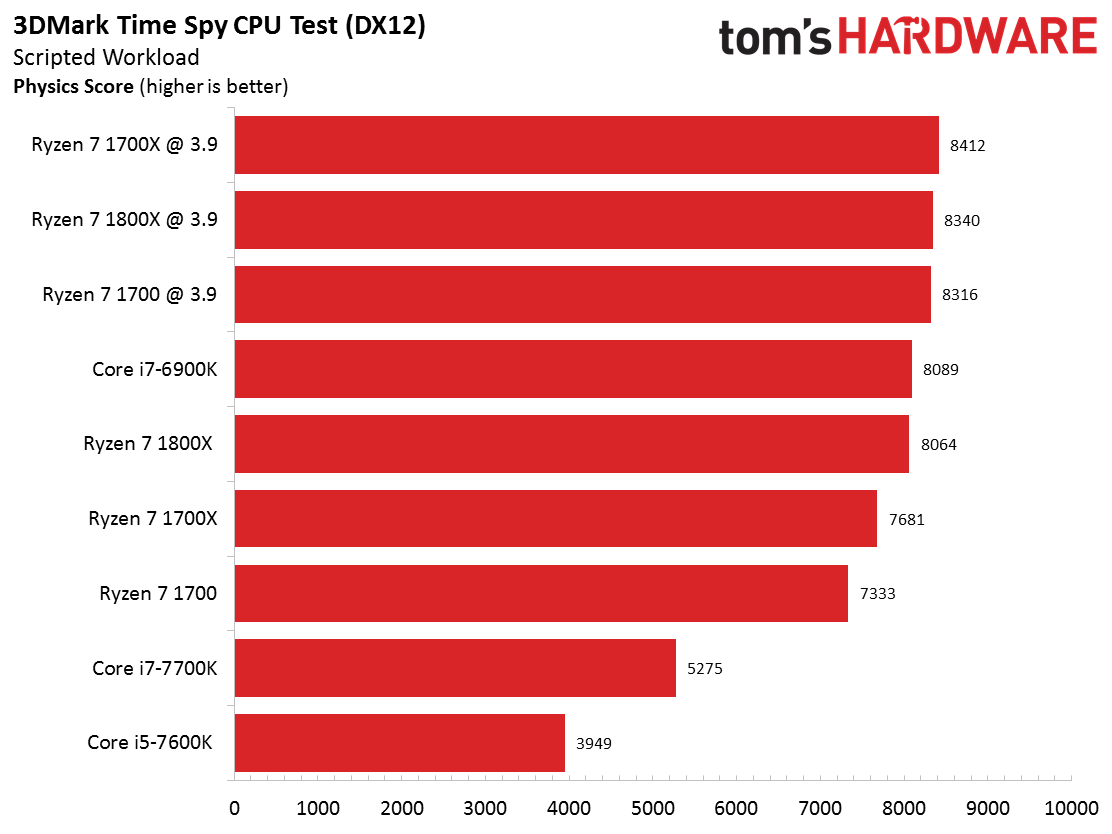
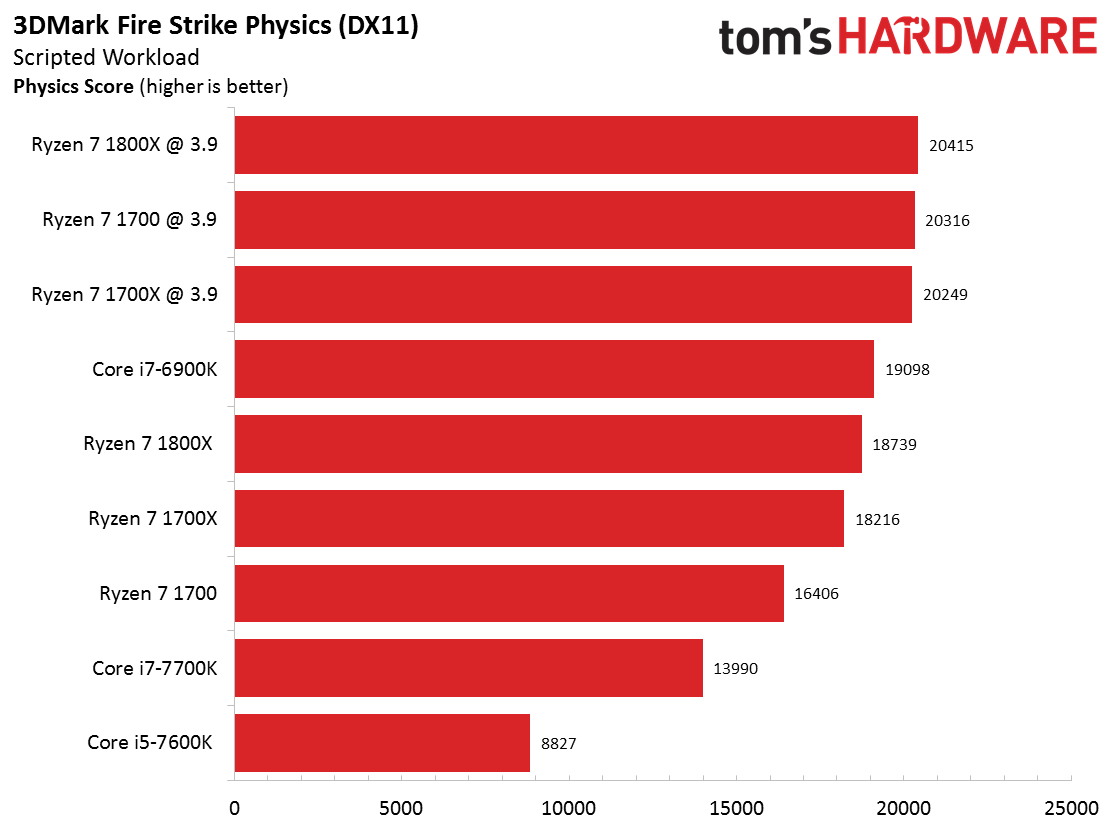
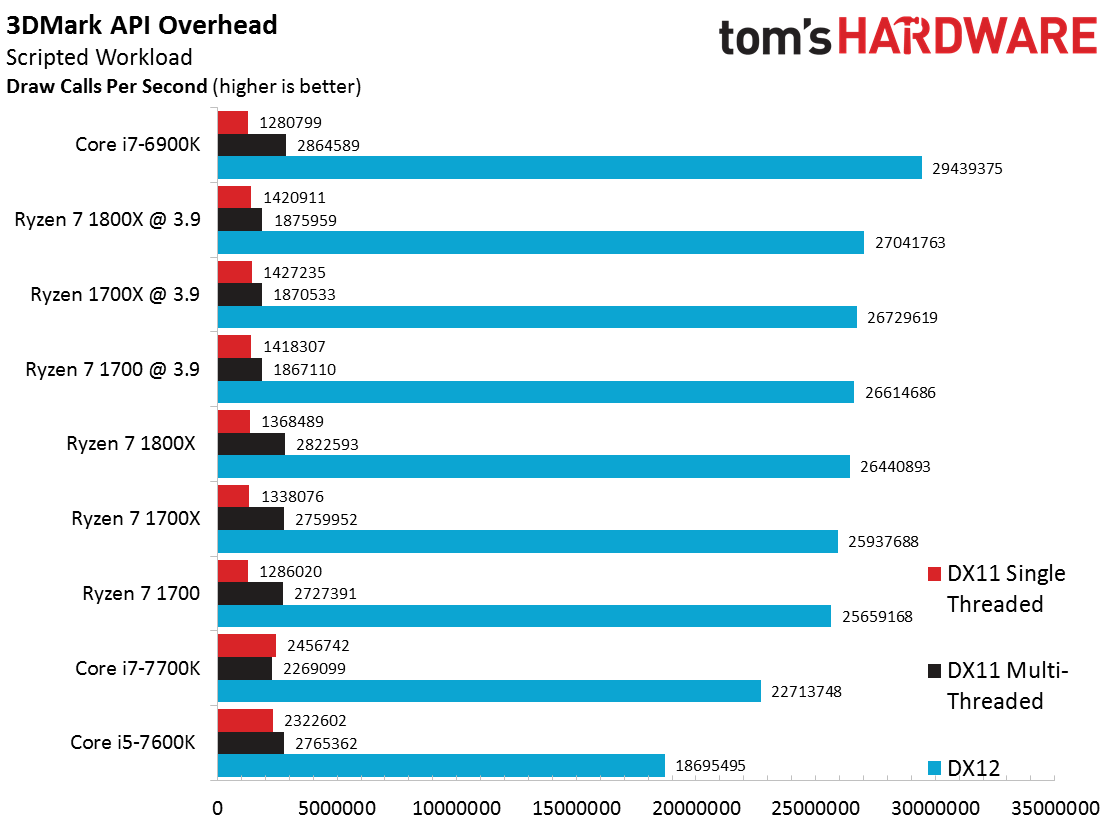
The DX11 and DX12 CPU tests reveal a similar trend. Ryzen 7 1700 trails the other eight-core processors, but passes the Core i7-6900K once we overclock it. Of course, the same treatment applied to Intel's chip would have a similar effect, so we'll stop short of calling this an AMD victory.
The quad-core Core i7-7700K and i5-7600K are far less potent in the threaded Time Spy and Fire Strike tests. However, they leverage their superior IPC throughput and clock rate to turn in a solid showing during the single-thread DX11 API overhead metrics. Intel's four-core CPUs are also competitive against the Ryzen processors in multi-threaded DX11 draw call performance, which helps explain their commanding lead in most gaming benchmarks.
DX12 leverages additional cores more efficiently, which turns the tables in favor of the eight-core chips. AMD's 1700 makes a solid showing, though it naturally trails the quicker 1700X and 1800X at stock settings. The overclocked 1700 pulls closer to its companions, but all overclocked Ryzen 7 processors suffer curiously reduced DX11 multi-threaded performance compared to stock settings. Through it all, the stock Core i7-6900K stubbornly refuses to budge from its commanding lead in DX11 threaded and DX12 tests.
Ashes of the Singularity: Escalation
Ashes of the Singularity is notoriously CPU-bound, but it responds well to higher core counts and clock rate, which makes it particularly well suited for examining the impact of increased processing performance on CPU-intensive titles.
Lackluster results in Ashes of the Singularity was a notable thorn in Ryzen's side, which surprised us given the purportedly close collaboration between AMD and Stardock/Oxide. Before the Ryzen launch, AMD stated that Ashes of the Singularity's Nitrous game engine wasn't optimized to fully leverage Ryzen's unique cache topology and SMT implementation, but that a patch was inbound. We gained access to the pre-release update and recorded significantly better performance from Ryzen 7. We saw the Core i7-6900K speed up too, though.
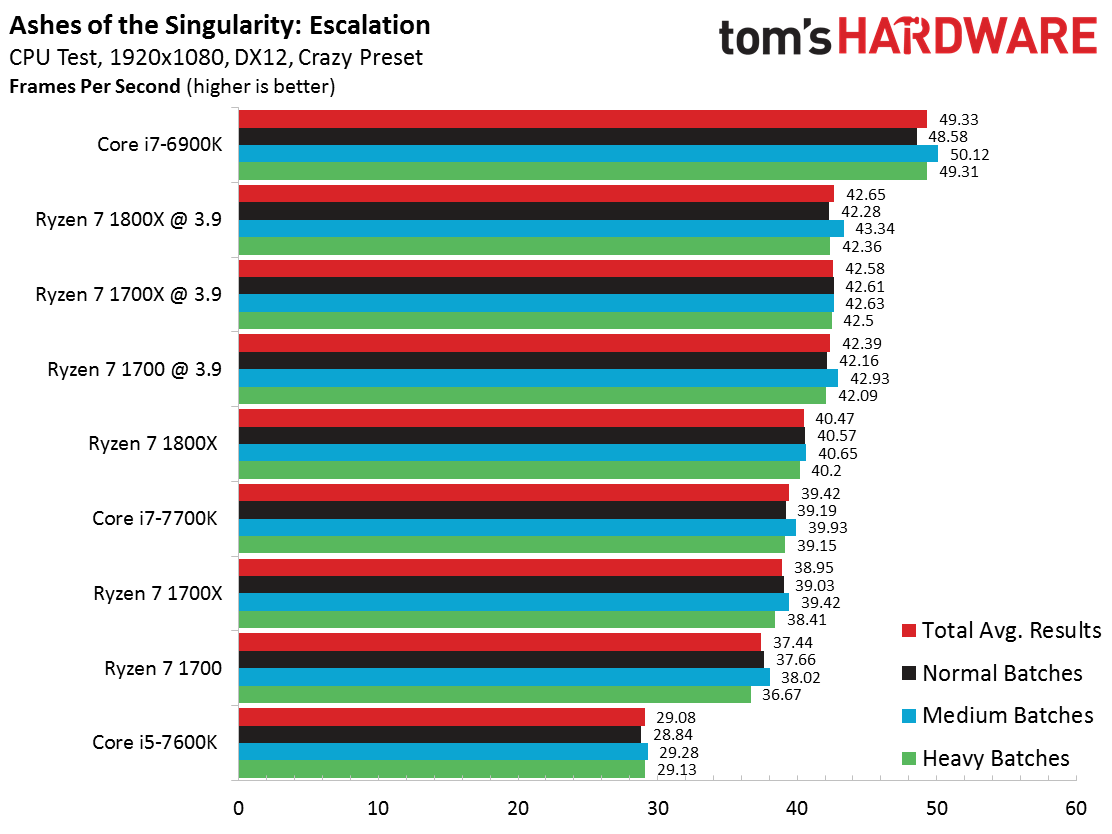
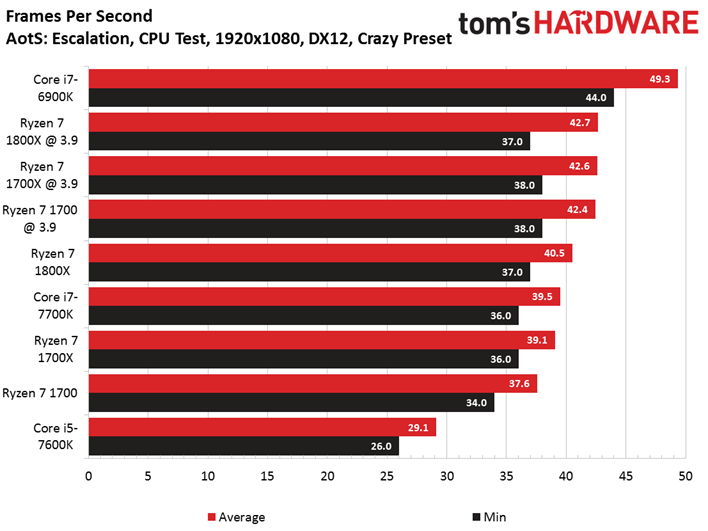
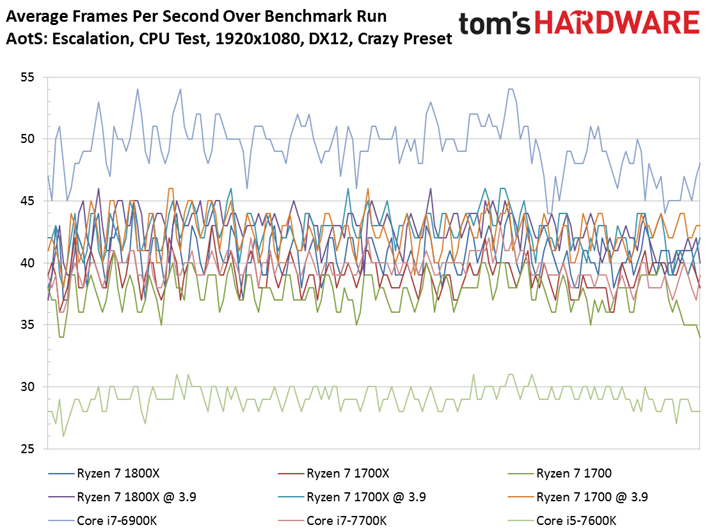
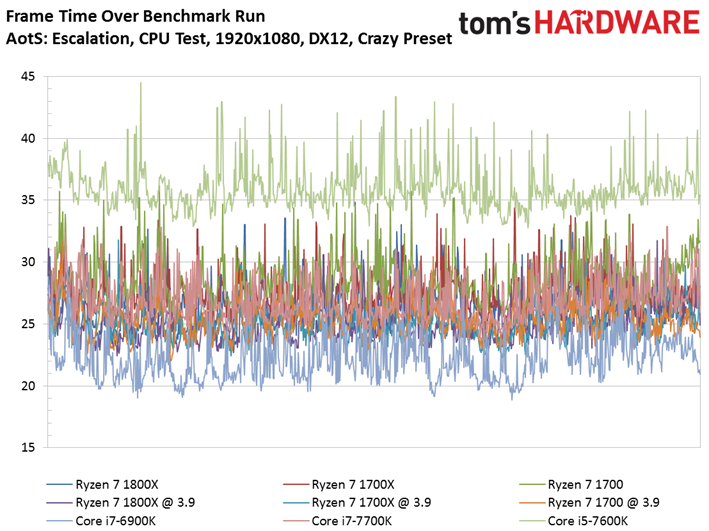
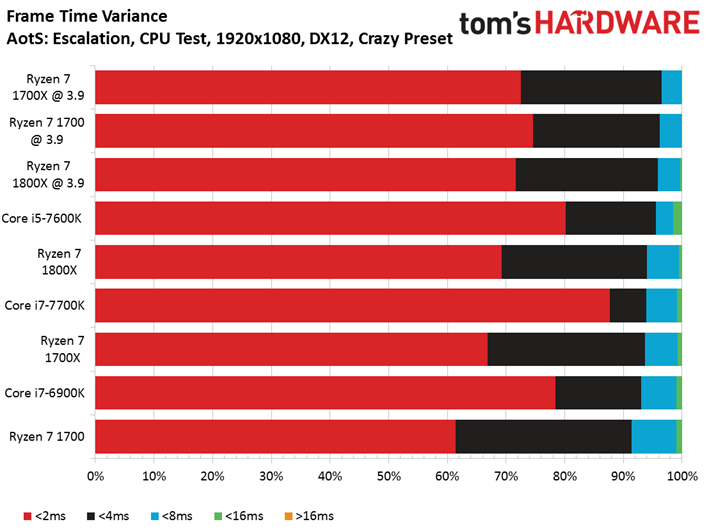
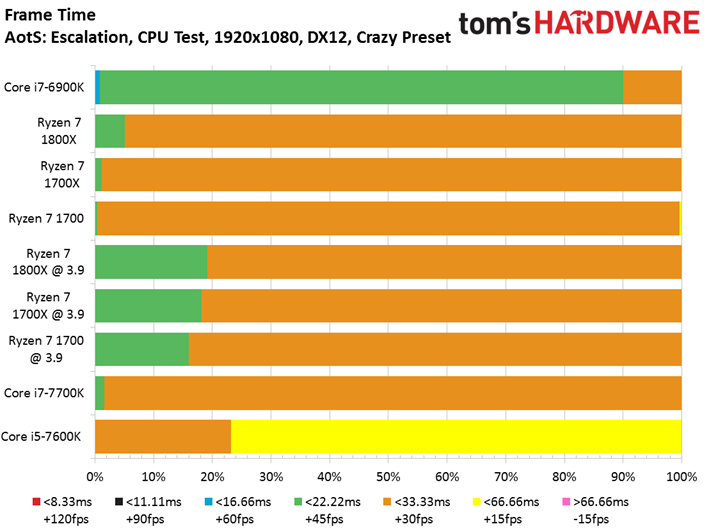
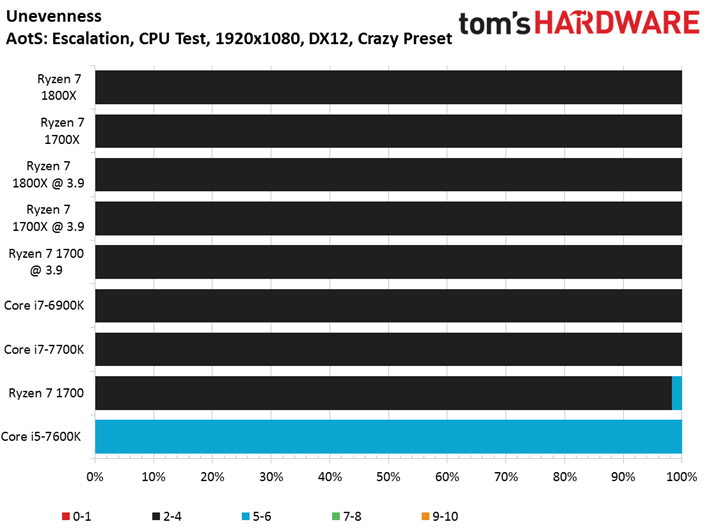
The stock Ryzen 7 1700 and 1700X can't beat a stock Core i7-7700K, but a little overclocking puts them in the lead. Unsurprisingly, though, the Core i7-6900K asserts its dominance with a large lead over the other processors.
Get Tom's Hardware's best news and in-depth reviews, straight to your inbox.
Battlefield 1
We dialed Battlefield 1 up to the Ultra preset and repetitively took an armor-laden stroll across the O La Vittoria landscape.
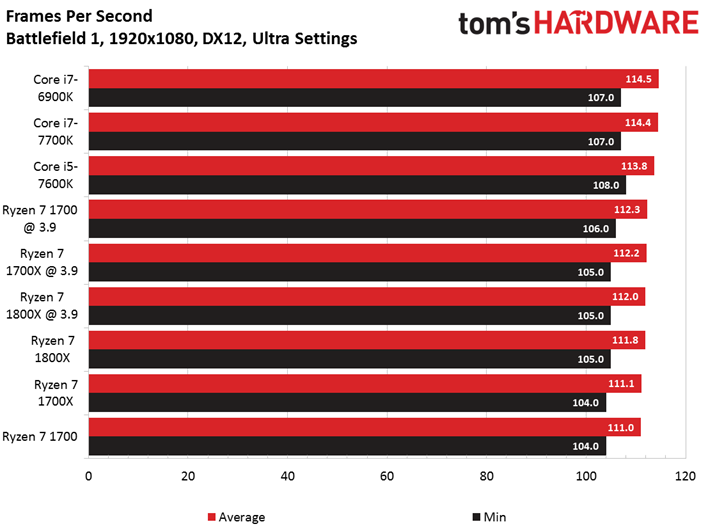
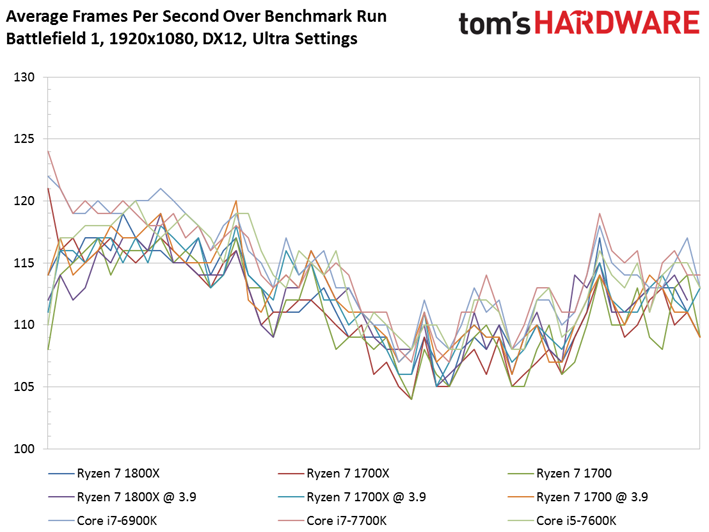
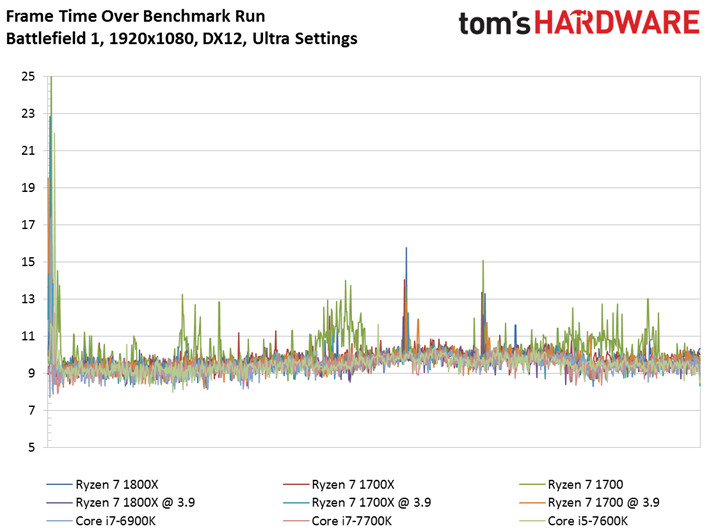
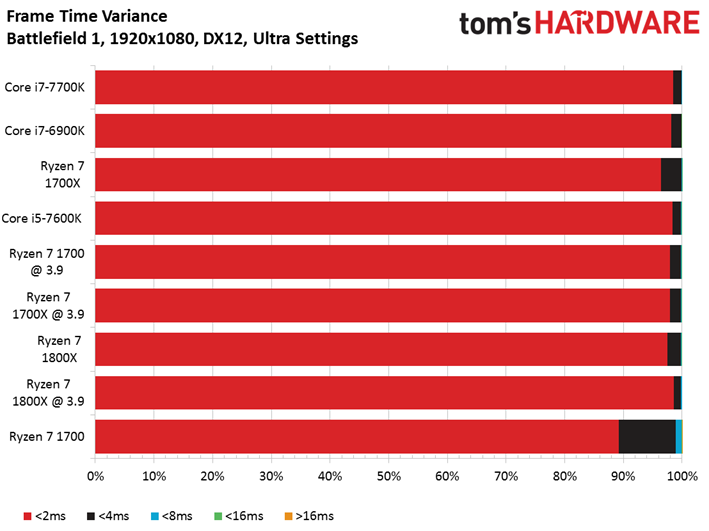
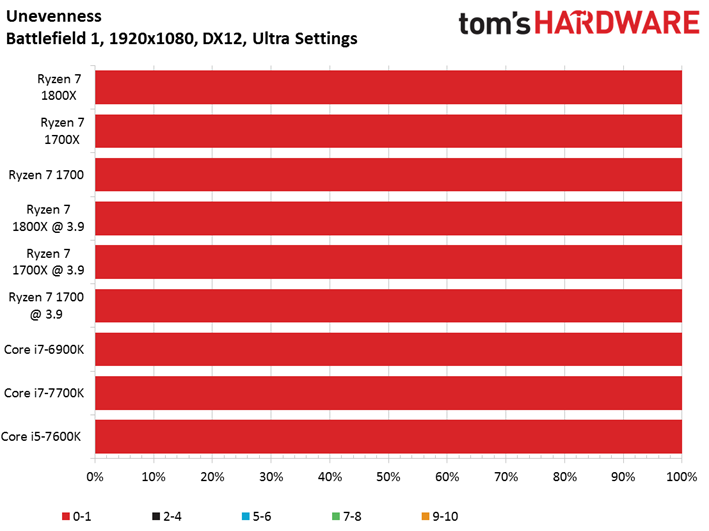
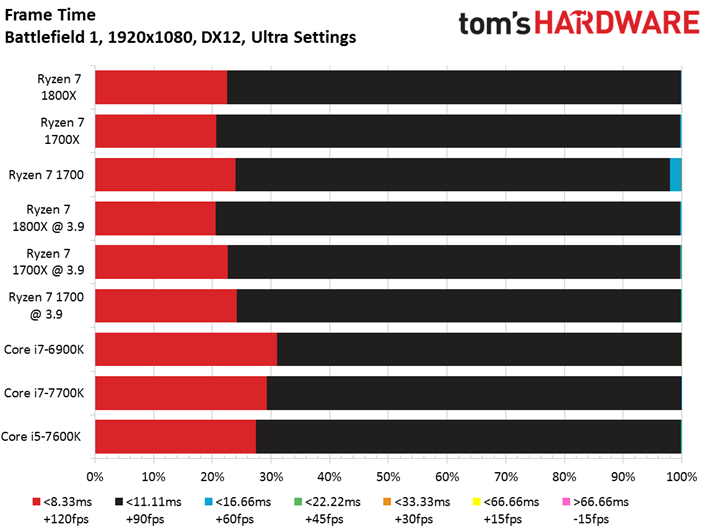
We run into a graphics bottleneck during the test, so we don't observe much variation between contenders. They all enable smooth game play through our test sequence. This is why AMD says Ryzen is great for high-res gaming!
Battlefield 4
Battlefield 4 also leans on the GPU more than the CPU, so again, we notice little variation at the upper end of the 1920x1080 benchmark results.
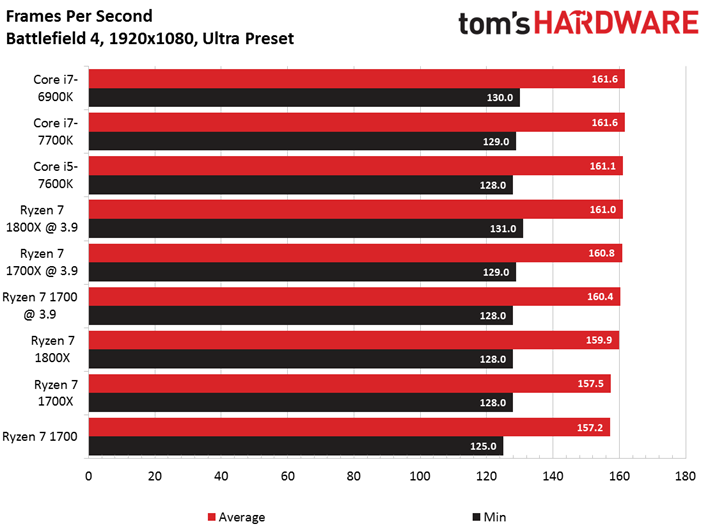
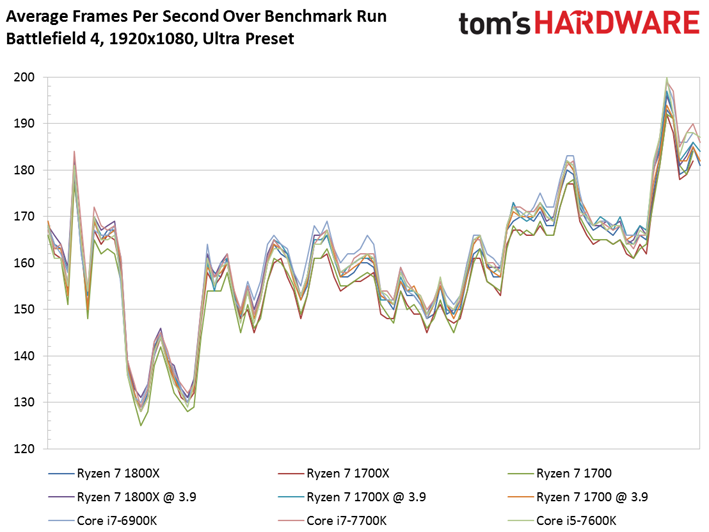
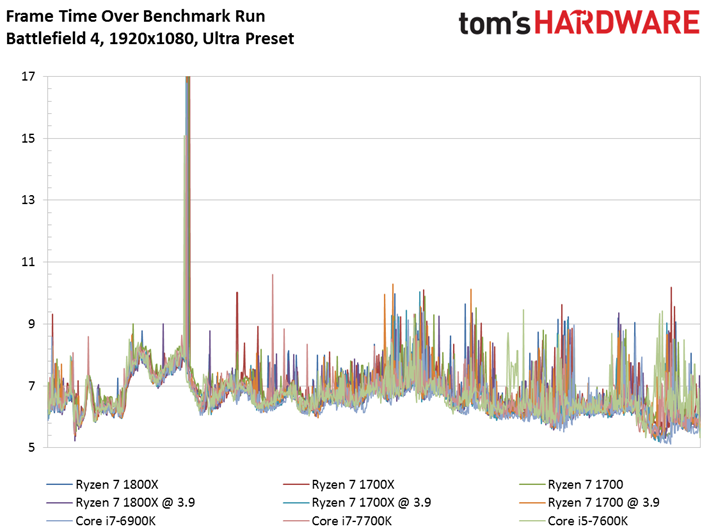
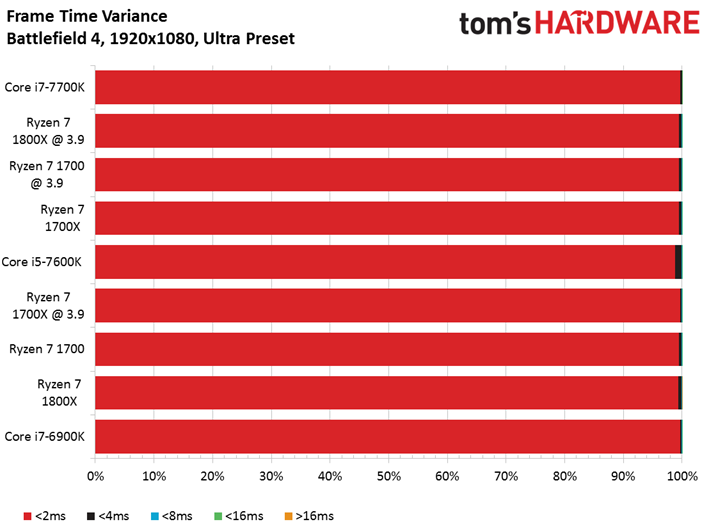
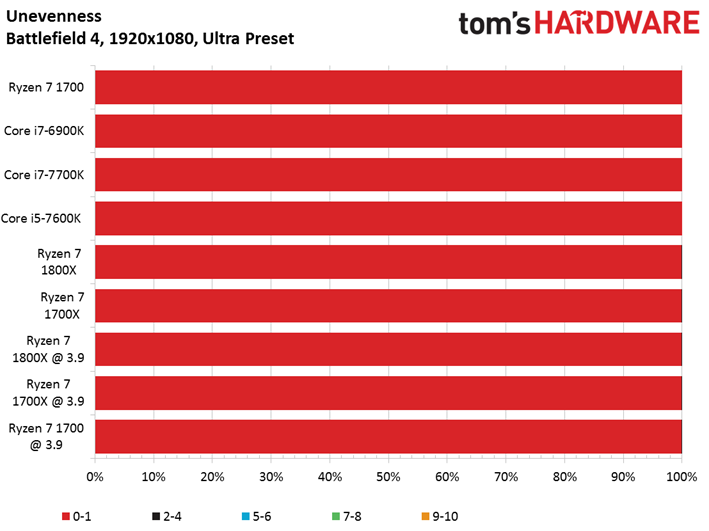
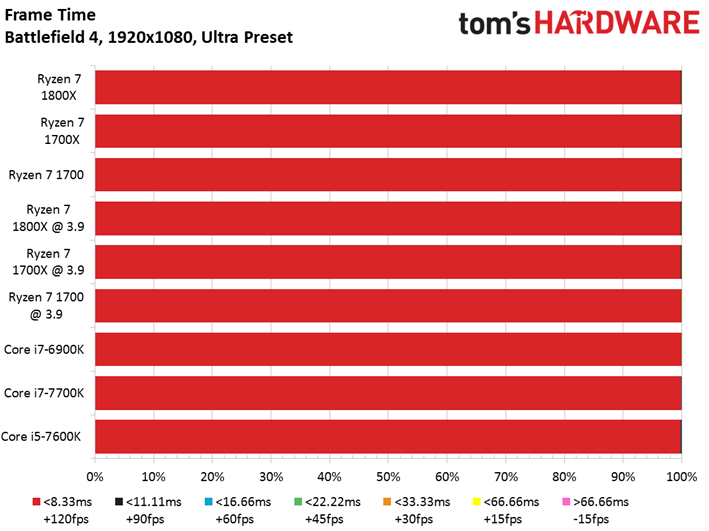
The Ryzen 7 1700 and 1700X trail the other contenders, but pull up to the faster processors after overclocking. In many ways, these results mirror the common trend we see at higher resolutions. All of the processors offer acceptable performance when you encounter a graphics bottleneck.
Current page: 3DMark, Ashes of the Singularity, Battlefield 1 & 4
Prev Page Overclocking & Test Setup Next Page Civilization VI AI & Graphics Test, Deus Ex: Mankind Divided, GTA V
Paul Alcorn is the Editor-in-Chief for Tom's Hardware US. He also writes news and reviews on CPUs, storage, and enterprise hardware.
-
mitch074 And how about testing with some AMD GPU? Seems Ryzen gets the short hand of the stick when using an Nvidia GPU... https://forums.overclockers.co.uk/threads/nvidia-dx12-driver-holding-back-ryzen.18774744/Reply -
envy14tpe Why no 1440p or 4k gaming? Who buys 1700 for 1080p gaming? In gaming, the new 1700, 1700x, 1800 don't compare to 7700k in gaming. But i don't see that like all other testing methodologies done by likes of gamernexus and what not.Reply
EDIT. Based on the downvoting of this comment it seems AMD lovers are a little butt hurt. -
ykki Thanks for the review. Will Tom's bench (or has already benched) the R5s with AMD GPUs? (i5 + 1060, i5 + 480, R5 + 1060, r5 + 480)?Reply -
Paul Alcorn Reply19526350 said:Why no 1440p or 4k gaming? Who buys 1700 for 1080p gaming? In gaming, the new 1700, 1700x, 1800 don't compare to 7700k in gaming. But i don't see that like all other testing methodologies done by likes of gamernexus and what not.
Here is some recent testing at 1440p. It includes the 1700, as well.
http://www.tomshardware.com/reviews/amd-ryzen-vs-intel-kaby-lake-gaming,4977.html
-
envy14tpe Reply19526465 said:19526350 said:Why no 1440p or 4k gaming? Who buys 1700 for 1080p gaming? In gaming, the new 1700, 1700x, 1800 don't compare to 7700k in gaming. But i don't see that like all other testing methodologies done by likes of gamernexus and what not.
Here is some recent testing at 1440p. It includes the 1700, as well.
http://www.tomshardware.com/reviews/amd-ryzen-vs-intel-kaby-lake-gaming,4977.html
That shows the new AMD cpus as is. From all I see the i7-7700k blasts the new AMD 1700, 1700x, 1800x series at 1440p +. That's important to keep in mind for gamers that want the most out of a CPU n high end GPU. -
ddpruitt Replyeven if Ryzen isn't shaping up to be universally superior, as many hoped prior to launch.
This makes it difficult to universally recommend those high-end parts.
Why do they have to be universally superior? They do a killer job on highly threaded workloads and are a lot cheaper than equivalent Intel. Sure gamings a wash but they're all playable. Aiming for universally superior is shooting for the moon and doesn't happen even with a single Intel chip.
But looking at these figures on their own can be misleading. Remember that Intel's top Kaby Lake-based CPU demonstrated a commanding lead in the previous page's AutoCAD workloads, so it ends up offering superior performance per watt.
Any chance you can multiply the numbers out so we can compare the differences? -
TJ Hooker So I have to ask, is there any reason to buy a 1700X/1800X over a 1700 if you're comfortable with overclocking?Reply -
Ian_85 Can you please repeat this test after each of the Ryzen bios updates in April and May?Reply
I think people would be interested to show just how much performance in a new CPU architecture improves in the months after its initial release. -
elbert Reply
I dont believe that has Ashes of the Singularity updated tests. Good review and I would like to see more. Now that all the Ryzen's have been benchmarked on 1080p maybe 1440p and 4k would make a good review. With and without SLI/crossfire also just to see how it works for Ryzen. Possibly Gskills could pitch in some of their Flare X 3466 RAM for Ryzen.19526465 said:19526350 said:Why no 1440p or 4k gaming? Who buys 1700 for 1080p gaming? In gaming, the new 1700, 1700x, 1800 don't compare to 7700k in gaming. But i don't see that like all other testing methodologies done by likes of gamernexus and what not.
Here is some recent testing at 1440p. It includes the 1700, as well.
http://www.tomshardware.com/reviews/amd-ryzen-vs-intel-kaby-lake-gaming,4977.html